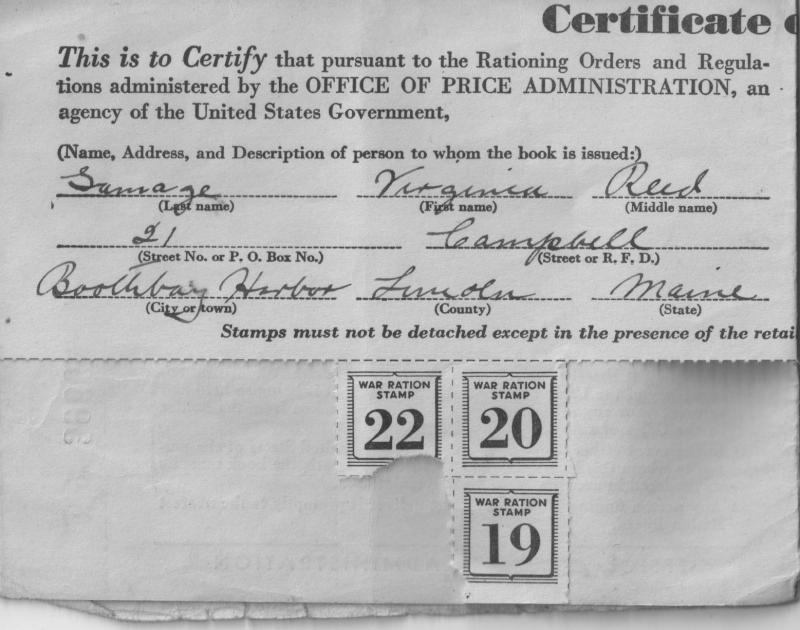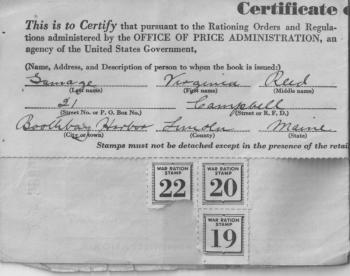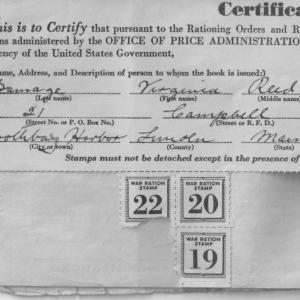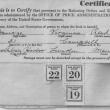World War II rationing
 One of four pages from Virginia Gamage's 1942 ration book with a few perforated stamps still attached. The other pages were taken up with penalties for misuse, certification and description of book holder, and name and place of the registrar with the local rationing board, one of 8,000 boards across the nation. Courtesy of the Boothbay Region Historical Society
One of four pages from Virginia Gamage's 1942 ration book with a few perforated stamps still attached. The other pages were taken up with penalties for misuse, certification and description of book holder, and name and place of the registrar with the local rationing board, one of 8,000 boards across the nation. Courtesy of the Boothbay Region Historical Society
 One of four pages from Virginia Gamage's 1942 ration book with a few perforated stamps still attached. The other pages were taken up with penalties for misuse, certification and description of book holder, and name and place of the registrar with the local rationing board, one of 8,000 boards across the nation. Courtesy of the Boothbay Region Historical Society
One of four pages from Virginia Gamage's 1942 ration book with a few perforated stamps still attached. The other pages were taken up with penalties for misuse, certification and description of book holder, and name and place of the registrar with the local rationing board, one of 8,000 boards across the nation. Courtesy of the Boothbay Region Historical Society
I've written a few articles about the homefront here during World War II, and any number of articles just touching on it. One article covered a scrap drive, another the government's vessel taking, and another the honor roll erected on the Common in 1944. Rationing was also once of vital interest to townspeople. I've heard many stories of how people coped with the limitations.
Almost as soon as Pearl Harbor was bombed in December 1941, rationing was instituted. Many staples were massively diverted overseas or couldn't be transported due to overseas gasoline and rubber needs. By January 1942 sugar sales were limited to two pounds to restrain hoarders. Ration books for everyone over the age of one soon came along for sugar and most other staples.Over the years, nine people have given us World War II ration books, including Blanche Goodspeed, Phil Kilton, Bobby Holbrook, and Toots Adams. An unusual and handsome item from Gleason Gamage was a ration token dispenser, resembling a Pez dispenser, with red and blue tokens in it.
Life by ration book
The National World War II Museum website relates, "Every American was issued a series of ration books which contained removable stamps good for items like sugar, meat, cooking oil, and canned goods. A person could buy a rationed item by giving the grocer the right ration stamp. Once a person’s ration stamps were used up for a month, no more purchases were possible until the next month. This meant planning meals carefully and not wasting food."
The customary spots to collect ration books were the high school on School Street in Boothbay Harbor, the Grange at the Center, and the School Street school at East Boothbay. During the war years Victory gardens became more prevalent as people felt the pinch of so few groceries. Late in the war 90 percent of Boothbay householders were said to be planning gardens for their needs. The Register commented on the meat ration, "After the supply of red meat arrived we noticed that people once more dare to drive their horses on the highways!"
Elliot Barlow's chicken exploits
Elliot Barlow, near the north end of Oak Street, turned to chicken raising to alleviate the meat shortage and to make a little money. Chickens were exempt from rationing. Elliot said, "During the war we picked chickens all night long, so we could sell them the next morning. You had to pick ‘em at night, ‘cause there was too much to do in the day time!" His wife Lib explained, "We took orders through the week and they could pick them up Friday or Saturday morning. What was left over, if we’d got real busy and picked and cleaned any more, they would go on sale the next morning."
"Our bedroom’s upstairs looking at the driveway. First time we did that, we heard people talking and talking and I thought, 'What in the devil, there must be church early or something.' People were lined up almost out to the street waiting for those darn chickens. We had five or six of us picking — Goose Conners, Raydelle (Barlow Stover), Normy (Brewer), and Bertha (Abbott). We’d spend the whole night in the cellar picking and cleaning them, and usually we’d find Normy asleep on the couch." Elliot went on, "After a while we went in commercial, built a building, put in an automatic picker and a scalder and the whole outfit. Jeez, boy, we went through some poultry."
Gas and oil
Before gas rationing took effect in mid-1942, there was a rush to fill gas tanks. Gas stations ran out of gas and, according to the Register, the "smell of gasoline was everywhere." People paid for stamps for their cars which had to match the gas ration stamps they used. Most cars were limited to three to five gallons a week unless the vehicle was needed for work. Roads were nearly deserted. By March 1942 the national speed limit was 40 to conserve gas. Soon the speed limit dropped to 35. Margaret Orne Kelly told me about the seemingly endless 35-mph road trip she and her husband Tex took from West Harbor to Washington. Tex was ordered there during the war.
I imagine that during wartime the great number of people who still heated with wood were thankful to be spared some worries. People had to register for home heating oil. By fall 1942 townspeople were asked to convert their house heating source to coal from oil, but that did not prevent a serious fuel oil shortage in town by January. The following year the oil allotments were two-thirds of the previous year's. By early 1944 schools and the library were closed for weeks or months because of no oil. Everybody from the age of one sacrificed and helped with the war effort in their daily lives. We seem to have wandered pretty far from the concept.
Event Date
Address
United States

























